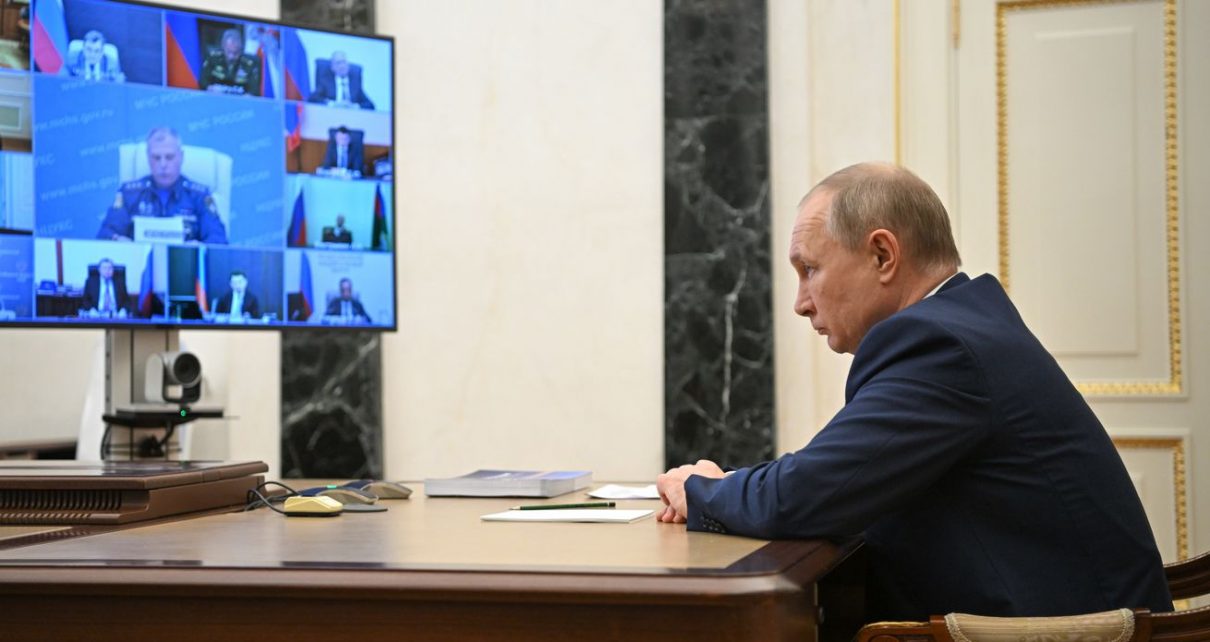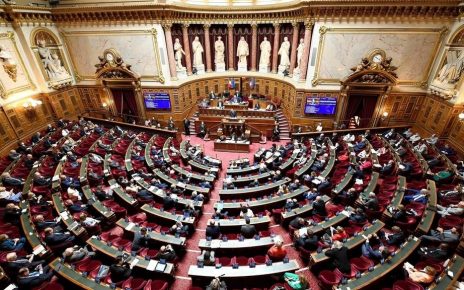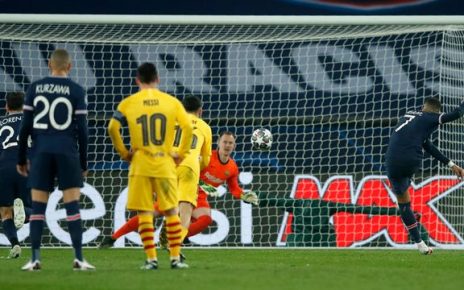
An independent journalist describes what life is like inside Russia’s parallel universe.
Almost everyone outside Russia views Vladimir Putin’s decision to invade Ukraine the same way: as an obscene and unnecessary atrocity.
But that’s because the outside world can see clearly what’s happening on the ground in Ukraine. For the average Russian, the picture looks very different. They know there’s something happening in Ukraine, but it’s not a “war” — it’s a “special military operation.” And if you watch the news, which is controlled by the state, you’re not seeing images of bombed apartment buildings or dead civilians on the streets, because that’s what a war looks like and there’s definitely not a war in Ukraine.
Indeed, Putin signed a law last week mandating up to 15 years in prison for spreading “false information” about the conflict, which includes using words like “war” or “invasion.” And while the state has largely controlled media in Russia, it has now shut down the last remaining independent channel and is even blocking Facebook in the hope of controlling the internet as well.
So what’s it like to live in this totalizing parallel universe? What are Russians seeing? What are they hearing? Most importantly, what do they believe?
To get some answers, I reached out to Alexey Kovalyov, a former editor for the Moscow Times and now an editor at Meduza, an independent news site formerly headquartered in Russia but now based in Latvia (the site has been blocked by the Russian government). Kovalyov was living in Moscow and escaped to Latvia last week as Putin’s regime imposed even heavier restrictions on press freedom.
We talked about what messages are getting through in Russia, how the media environment has evolved in the past couple of weeks, and if he believes reality might finally crash through the fog of state-sanctioned disinformation.
A lightly edited transcript of our conversation follows.
Sean Illing
Can you give me a sense of what it’s like on the ground right now in Russia?
Alexey Kovalyov
I’ve been gone for a week now, but there was already a massive bank run when I was still there. Now I hear the currency controls are creating all kinds of chaos and it’s getting harder to buy things, and that’s probably going to open up black markets for all sorts of essential goods. So the reality of what’s happening is already bleeding into everyday life for Russians.
Sean Illing
People can see the consequences of what’s happening, but who do they blame? Why do they think this is happening?
Alexey Kovalyov
People are just now seeing the immediate consequences of something they don’t fully understand yet. There’s an instinct in Russia, when you see a long line anywhere snaking around the corner, you just know you need to be in it, even if you don’t know why. You just know something bad is happening, you need to be in that line. That’s sort of what’s happening now.
But it’s really hard to say what people believe. I mean, I’ve seen polling from a week ago showing that 68 percent of Russians support the war, but that’s a state polling agency. And the polling doesn’t even use the word “war” because that would be unthinkable and the state has banned that language. So who knows what people really believe?
I can tell you what happens when you try to explain to people what’s happening in Ukraine, and remember that lots of people here have relatives in Ukraine. When you try to tell them, “This is your aunt’s apartment building in Kyiv. You see? It’s in ashes. It’s being bombed,” they don’t believe it, even if you show them the pictures. They say — and I know this from personal experience — “No, this couldn’t be happening, because they told us that we’re not harming civilians, that this isn’t a war. And if that is happening, it must be because these Ukrainian nationalists are bombing their own people so as to provoke the Russian army into fighting back and killing civilians.” That’s what we’re talking about here.
Sean Illing
We don’t really have a reliable indicator of public opinion in Russia, right? As you said, the polling is suspect and it’s now a police state, so how do we distinguish between what people say they believe and what they actually believe?
Alexey Kovalyov
We have no idea. What these polls reflect is how many people actually tune in to state media, which tells them what to think and what to say.
Even the poll I mentioned, like I said, it doesn’t ask people about a “war,” it asks them if they support a “special military operation” in Ukraine. And then it asks what you think the goals of this special military operation [are] and gives you choices like “The denazification of Ukraine” or “The protection of Russian-speaking peoples in Ukraine.” None of them reflect what’s happening in Ukraine. They’re just letting people choose between the various talking points being pounded by the state.
Sean Illing
What’s it like to be a journalist right now in Russia? And just to be clear, I’m not asking about the hacks and the nihilists shilling for the state. I’m asking about the journalists and the writers who object to this totalitarian nightmare, but they also face enormous risks if they break ranks.
Are they finding ways to tell the truth without telling the truth? Or are they all just getting the hell out of there while they still can?
Alexey Kovalyov
I frankly don’t know many journalists who are still there. I know a few people who still remain in Russia and they made a conscious decision to stay, and I admire their bravery. I wish I was in a position to make that decision, but I didn’t. My family begged me to get out. My own mother cried with joy when I called from across the border to tell her that I was safe.
But it’s not like all this happened overnight. We at Meduza were declared foreign agents last year by the government, and that was the government painting a huge target on our backs, calling us traitors and enemies of the people. So this has been a long time coming. We’ve been preparing for this moment for several years. It’s not unexpected. What is unexpected is how quickly it happened.
Sean Illing
It does seem like there’s been a shift in the regime’s approach to media and propaganda. For a long while, Russia has “flooded the zone” and bombarded the population with so many contradictory accounts of reality that they weren’t sure what to believe, or they were too cynical to believe anything. But now it’s full Orwellian control of reality, and that’s a much heavier lift because it’s not about undermining consensus, which is easy; it’s about enforcing one.
Alexey Kovalyov
Yeah, absolutely. There has definitely been a shift. And I have to be honest, there were a handful of people here who have been warning about this for a long time, who were telling people like me that this was going to be a fascist dictatorship one day, and we’ve been dismissing these people. We were like, “Come on, Putin is a cynic, he’s evil in so many ways, but at least he’s a rational guy. All he wants to do is get himself insanely rich. He’s not going to do anything really drastic.”
But we were all fucking wrong. The alarmists were right all along, and almost every one of them is either dead or in jail or exiled.
Sean Illing
People outside Russia are seeing the videos of people protesting on the streets in Moscow and St. Petersburg, and I think a lot of us want to believe that Putin can’t contain this, that there will be a revolt. But I worry that that’s mostly wishful thinking. Are you convinced that this will put a real dent in Putin’s regime?
Alexey Kovalyov
No, not really. What you’re seeing from these protesters on the streets is possibly the bravest thing I’ve seen, and it’s mostly women who are facing real violence and serious prison time. These people are getting the shit beat out of them by the police. They’re the bravest people in Russia right now because they know what they’re facing.
But we’re talking about a few thousand people in a country of over 140 million people. It’s not nearly enough to even put a dent in Putin’s regime. What it’s really going to take is the silent majority, or Putin’s passive electorate, who for all these years have just been doing what they’re told, they’re going to have to make a stand. But I have no idea what it would take for these people to wake up. I really have no idea.
All I know is that we’re in uncharted waters. All these major foreign media outlets, like the New York Times and the BBC, are fleeing Moscow. That’s never happened. The New York Times has had a bureau in Moscow throughout the entire 20th century, including three revolutions and two world wars and the entire Cold War. But now Moscow isn’t safe for the New York Times. I really don’t have the words to describe how unpredictable this situation is.
Sean Illing
Again, I don’t want to dreamcast here, but is it possible that Putin isn’t as popular as he appears? Is it possible that there’s an undercurrent of discontent waiting to be tapped?
Alexey Kovalyov
Maybe. It’s so hard to know. You can’t trust any of the polling data, especially the polling run by state-owned organizations. The state controls the entire media apparatus in Russia, and that’s incredibly hard to puncture. We just don’t know what people are thinking or what they truly believe or what’s possible. No one knows.
Sean Illing
As the pain of this war becomes more real, as the soldiers start returning home in coffins, as the economy continues to crater, maybe reality will come crashing through the fog of propaganda.
Alexey Kovalyov
I guess we’ll find out, won’t we? We’ve been interviewing parents of Russian soldiers, and not professional volunteer soldiers, but conscripts, people who were drafted into the army. These are 20-year-olds who, after a few months of boot camp, were shipped off to the front line and told this was all a training exercise. Many of these soldiers have been captured by the Ukrainians, and their parents are absolutely crushed because they were told their kids were at training drills. So there’s a lot of confusion.
But I’m not sure reality will come crashing through, or that it’ll happen soon enough. Sanctions move slow. Even though this military campaign has been such an obvious failure, unless someone in Putin’s close circle convinces him to pull back, which is unlikely, this is going to drag on and more people will die.
Who knows what that will mean? Will it spark a nationwide revolt? I don’t know. Here’s what I know: The Russian government has been preparing for this moment for a long time, and they’ve built up a police state to crush any signs of resistance with extreme violence.





